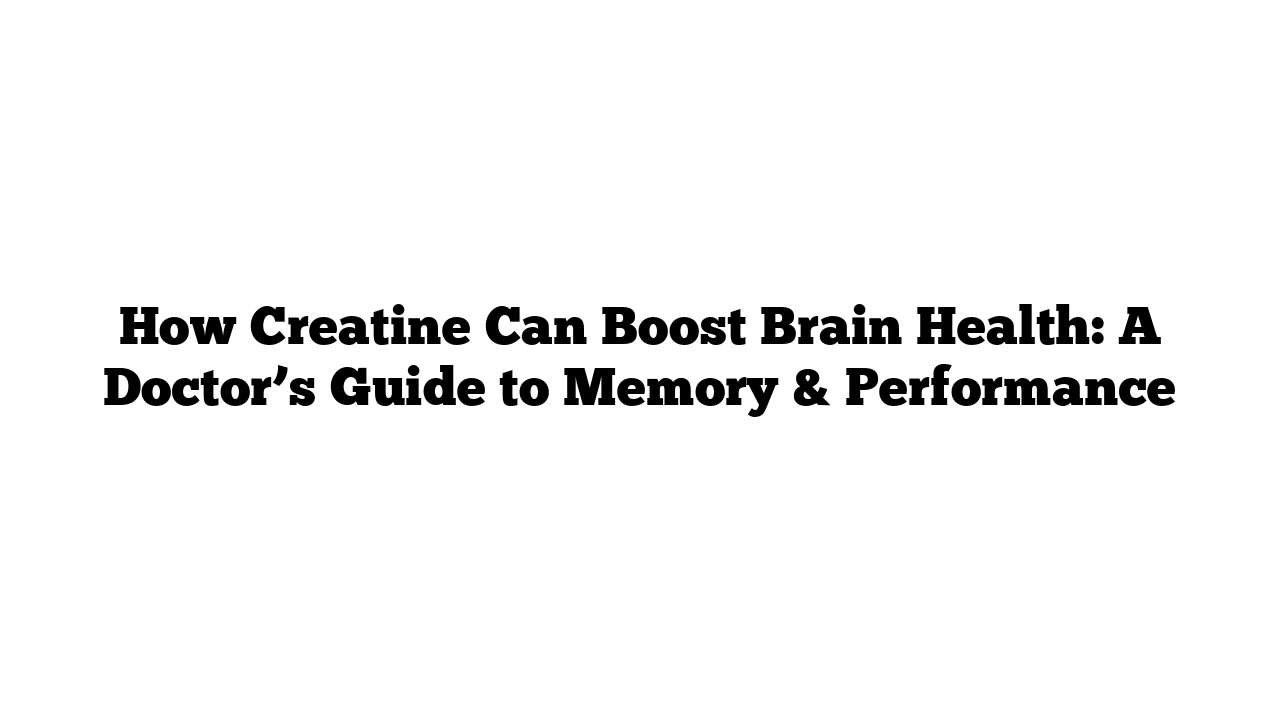When you think of creatine, the first thing that likely comes to mind is its connection to muscle-building and fitness. But did you know that creatine can also play a role in enhancing brain health? Yes, that’s right—this well-known muscle supplement has more to offer than just improving physical performance. It might even give your memory and brain function a boost. But don’t just take my word for it; let’s dive into the research and see what the science says about creatine and brain performance.
What Is Creatine and How Does It Work?
Creatine is a naturally occurring compound found in your muscles and brain. It’s made up of amino acids and helps generate ATP (adenosine triphosphate), the energy currency of your cells. ATP is essential for almost all bodily functions, and brain cells are no exception. To understand how creatine impacts your brain, let’s look at how your neurons (brain cells) use energy.
Your brain cells are constantly firing off signals, and doing so requires a lot of energy. The ATP used in these processes is extremely important for things like memory, focus, and cognitive function. When ATP levels drop, your brain struggles to function at its best. That’s where creatine comes in—by donating a phosphate molecule to ATP, creatine helps recharge and maintain energy levels in your brain, allowing it to perform better.
Can Creatine Improve Memory?
The big question: Does creatine help with memory? Well, the answer isn’t as simple as a yes or no.
Recent studies have shown that creatine can have an effect on memory, but it’s not the same for everyone. A meta-analysis (a study of several studies) reviewed creatine’s impact on memory performance. The results were a bit surprising:
- For individuals under the age of 65, creatine supplementation didn’t show a significant impact on memory.
- However, for individuals aged 65 and older, creatine seemed to improve memory.
This indicates that creatine might be more effective for older individuals, possibly due to the natural decline in ATP production and creatine levels in the brain as we age. It’s worth noting that this effect is not universal—creatine’s impact on brain performance can vary depending on factors like age, dosage, and even the type of memory tests used in the studies.
The Dosage Debate: Does It Matter?
There’s been some debate about the ideal dosage of creatine for cognitive benefits. In many fitness circles, 5 grams per day is the standard dose for muscle building. But when it comes to brain performance, is higher dosing—such as 20 grams per day—better?
Well, based on recent research, the answer seems to be no. The studies analyzed found that both low and high doses of creatine did not show any significant effect on memory in younger individuals. The issue here is that the results were often mixed because the studies included both younger and older participants. When the data was adjusted, the overall effect for memory was minimal.
However, there may still be a slight edge for higher doses in other areas of brain function, like reaction time, decision-making, and mood. But these findings are still speculative and need further research.
How Does Creatine Benefit Older Adults?
Creatine’s potential benefits for the brain are particularly evident in older adults. As we age, creatine production naturally declines, which can impact cellular energy in the brain. For older individuals, adding creatine might help replenish the brain’s levels of this crucial energy compound.
In fact, studies have shown that creatine supplementation can support cognitive functions in older adults, especially when it comes to memory. This might be because, as we get older, our mitochondria (the powerhouses of our cells) become less efficient at producing ATP. Creatine provides a boost in energy, helping the brain function more efficiently.
The Science Behind Creatine and the Brain
Now, let’s take a closer look at what’s going on at the cellular level.
Your brain cells, like all other cells in your body, need energy to function. That energy comes from ATP. When ATP breaks down during use, it turns into ADP (adenosine diphosphate), which is less effective for energy production. This is where creatine plays a critical role. Creatine phosphate donates its phosphate to ADP, converting it back into ATP. This process recharges ATP levels, giving your brain the energy it needs to keep performing at its best.
But that’s not all. Creatine can also act as an antioxidant, reducing oxidative stress, and protecting cells from damage. It may also help regulate brain cell excitability, reducing the risk of premature cell death. These additional benefits could make creatine a powerful tool for overall brain health, especially for those facing age-related decline.
Final Thoughts: Who Should Take Creatine?
If you’re under the age of 65 and looking to improve memory, creatine might not be the magic pill you were hoping for. However, if you’re 65 or older, creatine could be a valuable supplement for enhancing memory and overall brain performance.
In terms of dosage, 5 grams per day seems to be sufficient for most people, but the specific benefits may vary. Higher doses of creatine might offer additional benefits, but more research is needed to confirm this.
While creatine is often thought of as just a muscle-building supplement, it’s clear that it has potential benefits for brain health, especially for older adults. It’s worth considering if you’re looking to improve cognitive function and protect your brain as you age.
For more in-depth insights and the latest research on supplements and brain health, visit medicaltimes.io.
